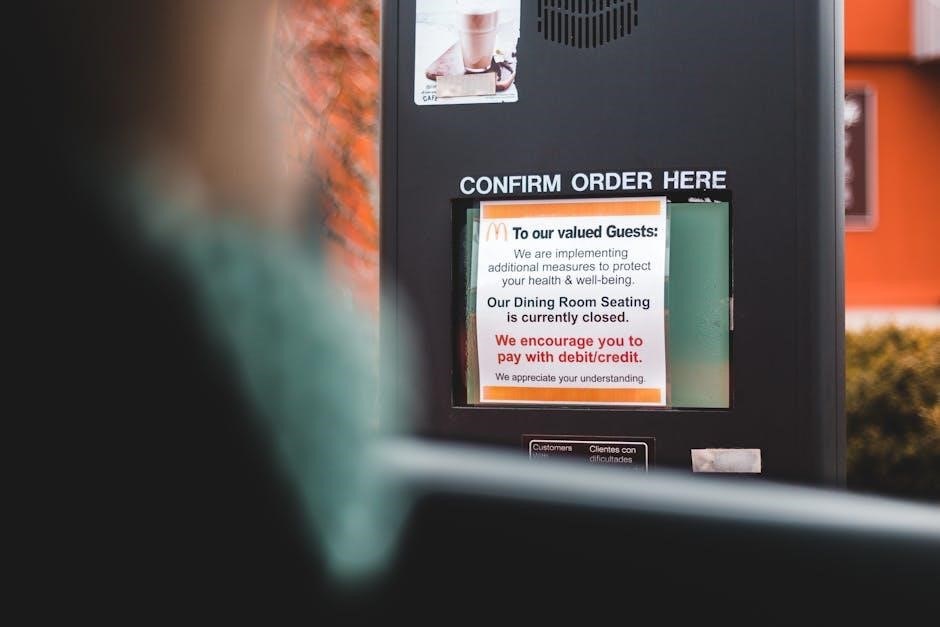Effective customer instructions are crucial for a smooth rental experience․ Clear communication ensures customers understand their responsibilities, from equipment handling to payment terms, fostering trust and minimizing disputes․
Importance of Clear Communication in Rental Businesses
Clear communication is essential for building trust and ensuring a seamless rental experience․ It helps customers understand their responsibilities, reduces misunderstandings, and ensures compliance with rental policies․ Effective communication also addresses customer inquiries promptly, enhancing satisfaction and loyalty․ By providing detailed instructions, businesses can minimize disputes and foster a positive relationship with their clients․
Key Areas to Cover When Instructing Customers
When instructing customers, rental businesses must cover key areas such as rental agreements, equipment usage, payment terms, delivery procedures, and return policies․ Clear guidelines on liability, maintenance, and emergency protocols are also essential․ Additionally, businesses should explain their refund and cancellation policies, ensuring customers understand their responsibilities and the consequences of non-compliance․ This fosters transparency and a smooth rental experience․
Understanding the Rental Agreement
Customers must be instructed on the rental agreement’s terms, including payment details, rental duration, cancellation policies, and liability clauses to ensure clarity and mutual understanding․
Overview of Terms and Conditions
Customers must be clearly instructed on the rental agreement’s terms, including payment terms, rental duration, cancellation policies, and liability clauses․ This ensures both parties understand their obligations and reduces potential disputes․ Clear communication of these conditions is essential for a smooth rental process and maintaining a positive customer relationship․
Duration of Rental and Cancellation Policies
Customers must be informed about the rental period, including start and end dates, and the process for extending or ending the rental early․ Clear cancellation policies, including refund procedures and potential late fees, should be outlined to avoid disputes․ This ensures both parties understand the terms and expectations for the rental duration and any changes;
Equipment Usage and Maintenance Guidelines
Customers must be instructed on proper equipment handling, maintenance, and inspection to prevent damage and ensure longevity․ Clear guidelines help avoid misuse and promote safety․
Proper Handling of Rented Items
Customers must be instructed to handle rented items with care, avoiding misuse or excessive wear․ They should inspect items before use, store them securely, and use original packaging when transporting․ Adherence to manufacturer guidelines ensures safety and prevents damage․ Regular cleaning and proper fueling or charging, if applicable, are essential․ Reporting any damage promptly helps maintain trust and avoids additional fees․
Regular Maintenance Expectations
Customers should be informed of their role in maintaining rented items․ Regular checks for damage or wear, proper cleaning, and adherence to usage guidelines are essential․ They must report any issues promptly to prevent further damage․ Neglecting maintenance may result in additional fees or liability for repairs, emphasizing the importance of responsible care throughout the rental period․

Payment and Refund Policies
Customers must be instructed on accepted payment methods, due dates, and refund processes․ Late fees and eligibility criteria for refunds should be clearly outlined to avoid disputes․
Payment Methods and Due Dates
Rental businesses must inform customers about accepted payment methods, such as credit cards, bank transfers, or online platforms․ Clearly state payment due dates, late fee policies, and any grace periods․ Offering flexible payment plans can enhance customer satisfaction․ Ensure transparency in billing cycles and provide receipts or invoices for record-keeping, building trust and ensuring timely payments․
Refund Process and Late Fees
Customers must be informed about the refund process, including timelines and eligibility criteria․ Clearly outline late fee structures, such as daily charges or percentage-based penalties․ Specify when and how refunds are issued, ensuring transparency․ Advise customers to review the rental agreement for details and communicate promptly to avoid additional charges or disputes․
Delivery and Return Procedures
Instruct customers on delivery options, associated costs, and return procedures․ Ensure they understand scheduling, handling fees, and the inspection process for damage upon return․
Delivery Options and Costs
Provide customers with clear details on delivery options, such as standard, express, or local pickup․ Outline associated costs, including mileage fees, fuel surcharges, and packaging expenses․ Ensure transparency about additional charges for special delivery requests, like after-hours or remote location drops, to avoid misunderstandings and build customer trust․
Return Process and Inspection
Customers must be instructed on the proper return process, including designated drop-off locations and timeframes․ Clearly explain the inspection procedure to assess equipment condition, noting any damage or missing items․ Highlight how returns are processed, including refunds or deductions, ensuring transparency to avoid disputes and maintain a smooth rental experience․

Customer Support and Assistance
Instruct customers on available support channels, including phone, email, and live chat․ Provide emergency contact details for urgent issues, ensuring timely assistance and resolving concerns promptly․
Availability of Support Channels
Rental businesses must inform customers about accessible support options, such as phone, email, and live chat․ Clearly outline response times and operating hours․ Ensure customers know how to reach emergency assistance for critical issues․ Providing multiple contact methods enhances accessibility and customer satisfaction, ensuring help is available whenever needed․ This fosters trust and loyalty․
Emergency Contact Information
Customers must be provided with emergency contact details, such as a 24/7 hotline or a dedicated support number․ Include clear instructions for urgent situations, like equipment damage or accidents․ Display this information prominently in rental agreements and online platforms․ Ensuring customers can quickly access help during emergencies minimizes risks and resolves issues efficiently, safeguarding both parties․
Importance of Customer Feedback
Customer feedback is vital for improving services and growing your business․ It helps identify strengths and areas for improvement, ensuring a better experience for future customers․
How Feedback Improves Services
Customer feedback provides insights into strengths and areas for improvement․ It helps refine rental processes, enhance equipment quality, and tailor services to meet customer needs, ensuring satisfaction and loyalty․
Encouraging Reviews and Ratings
Encourage customers to leave genuine reviews by making the process simple and convenient․ Direct them to your website or social media platforms to share their experiences․ Incentivize feedback with discounts or exclusive offers, ensuring reviews are voluntary and ethical․ Positive ratings enhance credibility, attracting new customers and boosting your rental business’s online presence․

Liability and Insurance Coverage
Explain liability terms and insurance options to protect customers and rented items․ Ensure customers understand their responsibilities and coverage limits to avoid disputes and financial loss․

Understanding Liability in Rentals
Customers must understand their liability for damages or losses during the rental period․ Clearly explain who is responsible for accidents or equipment damage․ Ensure they know insurance coverage options and exclusions․ This protects both parties and avoids disputes․ Make sure customers acknowledge these terms before renting to ensure compliance and mutual understanding of responsibilities․
Insurance Options for Rented Items
Customers should be informed about available insurance options to protect rented items against damage, loss, or theft․ Explain the coverage types, such as collision damage waivers or equipment protection plans․ Highlight how these options reduce financial risk for both parties․ Ensure customers understand what is covered and any additional costs involved․ Clear communication helps them make informed decisions and ensures peace of mind during the rental period․

Niche-Specific Instructions
Customers must be instructed on niche-specific requirements, such as handling luxury items or medical equipment․ Tailored guidelines ensure compliance and proper usage, addressing unique needs effectively․
Special Requirements for Unique Rentals
Rental businesses must inform customers about special requirements for unique items, such as luxury decor or high-end equipment․ Instructions should cover handling, storage, and usage guidelines to prevent damage․ Additionally, emphasize specific care routines and any necessary certifications or licenses․ Ensuring clarity on these points helps maintain product quality and minimizes liability risks for both parties effectively․
Industry-Specific Compliance
Rental businesses must educate customers on industry-specific regulations․ For example, equipment rentals may require adherence to safety standards or permits․ Informing customers about legal obligations ensures compliance, mitigates risks, and avoids penalties․ Clear communication about these requirements is essential for maintaining operational integrity and fostering a responsible rental experience for all parties involved in the process․
Termination of Rental Agreement
Customers must be informed about conditions for terminating the agreement early, such as breach of contract or mutual agreement, and the resulting consequences, including potential fees or legal action․
Conditions for Early Termination
Customers must be made aware of specific conditions that allow early termination, such as breach of contract, non-payment, or mutual agreement․ The rental business should outline the required notice period and any associated penalties․ Early termination may also be triggered by equipment misuse or failure to comply with agreed terms, ensuring both parties understand their responsibilities and potential consequences․
Consequences of Breach of Contract
Customers must understand the consequences of breaching the rental agreement, such as late fees, damage charges, or legal action․ Failure to comply may result in termination of the contract, forfeiture of deposits, or additional penalties․ Repeated violations could also lead to restricted access to future rentals, emphasizing the importance of adhering to agreed terms and conditions․

Emergency Procedures
Customers must be instructed on emergency procedures, such as reporting equipment damage or accidents immediately․ They should know the contact information for urgent support and steps to secure the area to prevent further issues․
Handling Equipment Damage or Loss
Customers must be instructed to immediately report any equipment damage or loss․ They should secure the area, document the issue with photos, and await further instructions․ Failure to report promptly may result in liability․ Clear guidelines ensure proper handling and minimize potential disputes or additional charges, protecting both the customer and the rental business․
Steps in Case of Accidents
In case of an accident involving rented equipment, customers must immediately report the incident to the rental business․ They should secure the area to prevent further damage or injury, assess any injuries, and provide necessary aid․ Customers must contact authorities if required and notify the rental company promptly for guidance․ Ensuring safety and cooperation with investigations is crucial for resolving the matter effectively․
A well-instructed customer ensures a smooth rental experience․ Clear guidelines on responsibilities, procedures, and expectations build trust and mutual satisfaction, fostering long-term relationships and business success․
Summarizing Key Instructions
Rental businesses must instruct customers on understanding agreements, proper equipment usage, payment terms, delivery procedures, and return processes․ Clear guidelines on liability, maintenance, and emergency procedures ensure a seamless experience․ Providing detailed instructions fosters accountability, protects assets, and enhances customer satisfaction, building trust and encouraging repeat business․
Final Tips for a Smooth Rental Experience
Encourage open communication with customers to address concerns promptly․ Provide detailed checklists for equipment preparation and return․ Ensure customers understand emergency procedures and contact information․ Foster a positive experience by being proactive and responsive, ensuring all instructions are followed․ Clear communication and preparedness are key to building trust and ensuring a hassle-free rental experience for both parties․



